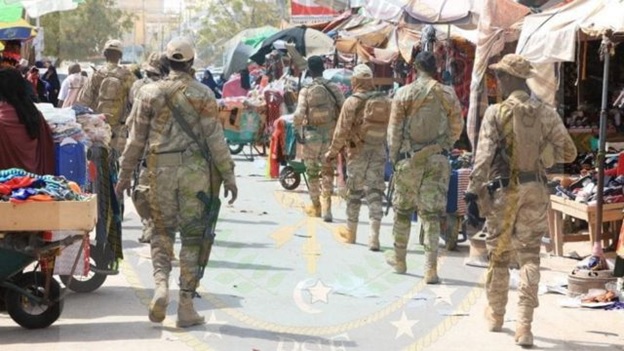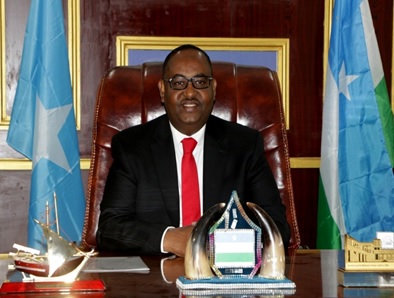By Rashid Darwiish
Civilian control of the military is a doctrine in military and politics that places ultimate responsibility for a country’s strategic decision-making in the hands of the civilian political leadership, rather than professional military officers[1]. In the case of Puntland, this power and authority is vested in Office of the President of the Regional State, with incumbent Said Abdullahi Deni exercising these powers at this point of time.

The recent confrontation in Bossaso between the Puntland Regular Security Forces and a section of the anti-terror unit, the Puntland Security Forces (PSF) led by sacked commander, Mohamoud Osman Diyano has sparked a heightened debate on the requisites for civilian control over the security realm with the overwhelming majority of Puntlanders backing President Deni’s swift action to bring the situation under control. Despite the outbreak of the now contained intra-security clashes, the overall good reputation of Puntland’s security forces remains intact and the men and women in uniform should be commended for their distinguished service to the State.
According to Dr. Richard Kohn, a foremost expert on civil-military relations, there is need to establish a tradition of civilian control over security, so as “to develop an ironclad system of political neutrality within the military establishment, and to prevent or forestall on a permanent basis any possibility of a coup or military intervention in political life[2].” He adds that “civilian control allows a nation to base its values and purposes, its institutions and practices, on the popular will rather than on the choices of military leaders, whose outlook by definition focuses on the need for internal order and external security.[3]”
While Kohn’s analysis is based mostly on western, and particularly Anglo-American experience, his assertion applies to any society, Puntland included, that practices democratic governance, or is making the transition to a government based upon the sovereignty and will of the people[4]. As the saying goes, the “purpose of the military is to defend society, not to define it” and therefore, civilian control over the military, which is vested in the Chief Executive, equally serving as the Commander-In-Chief (at national or state level) should remain absolute and all -encompassing.
Samuel P. Huntington, a great theorist of civilian control, argued in The Soldier and the State: The Theory and Practice of Civil-Military Relations, that the way to optimize civilian supremacy was to instill military professionalism[5].” By this, he meant that an officer corps focused on its own profession–and granted sufficient independence to “organize itself and practice the art of war without interference in those areas which required technical expertise–would be politically neutral and less likely to intervene in politics.” For President Deni, the PSF was trained to be a professional security force and as such, its commanders should focus on their combat role and leave key security decision-making, including the appointment and firing of commanders in the hands of the democratically-elected Regional State leader.
Although political scientists have addressed the field of civil-military relations across the board, special attention has been given to civil-military relations within democracies and, within that set, civil-military relations in the United States because the American case has figured so prominently in the theoretical development of the field[6].
Given that the PSF is a US-trained unit now fully under Puntland government’s control, it is worth examining how American Presidents have used the power vested in them as Commanders In- Chief, to dismiss high-ranking officers as a means to assert policy and strategic control. American examples on dismissals of armed forces’ top brass are relevant to Puntland and other jurisdictions because the US-led doctrine of civilian control over the military has become a universally-held principle.
High profile removals of senior military commanders include the November 5, 1862, order issued by President Abraham Lincoln to relieve Union general George B. McClellan, of command of the Army of the Potomac. Lincoln believed that McClellan should have pursued the Confederates more aggressively after his victory at the Battle of Antietam. Perhaps the biggest decision ever taken by an American Commander-In-Chief to sack an army commander was the April 1951, directive by President Harry S. Truman to relieve highly decorated Army General Douglas MacArthur of his command after MacArthur made public statements that contradicted the administration’s policies. The axe fell on MacArthur despite being a popular hero of World War II who was then the commander of United Nations forces fighting in the Korean War.
Unlike Truman who took direct action to dismiss General MacArthur, President Obama employed behind the scenes tactics to send home US Army Commander of the Afghanistan war Stanley McChrystal after a Rolling Stones article revealed he berated and mocked senior administration officials including then Vice-President, Joe Biden. Simply put, the dismissal of military commanders in the US remains a matter of presidential prerogative, and the perceived stay or departure of errant commanders was never a subject of negotiation between the US government and Congress or sections of the civil society. It is a testimony to the fact that a US President can execute dismissal of senior army commanders even in the absence of a criminal misconduct.
There is a general consensus globally among experts on civil-military relations that a national or sate president should act decisively in a context in which the respective leader has lost confidence in the leadership of a particular general or even a group of generals.[7] In the US, the power to do so is inherent in the President’s Commander-in-Chief authority under Article II, Section 2 of the Constitution, and it cannot be fettered by Congress.[8] The doctrine of civilian control over the military “ensures civilian superintendence over the military—and, as such, the subordination of the military to civilian (and democratically accountable) control”.[9]
Deni deserves full credit for his handling of the recent standoff between Puntland Forces and PSF. There are important lessons to draw from his timely action that has underscored the significance of civilian control over security matters. If the PSF belligerents were allowed to hold their sway, it would have not only sent a dangerous precedent in Puntland but across all other Regional States and even at Federal level. Deni needed to act decisively and fast and his decision to remove PSF commander from his post sends a strong message that insubordination by any elements within Puntland security establishment will not be tolerated.
Even though the intervention of elders and other prominent members of Puntland society was well-meaning, Deni made it clear that elders had crossed the red line when they capitulated to the unlawful demands by the fired commander to retain PSF’s assets including weapons. Deni rightfully noted that the state is the sole custodian of all its security assets including weapons and that their control cannot be left at the whim of others. Another lesson we derive from Deni is that any wrongful transfer of such assets to armed, non-state actors would endanger public safety and create a parallel centre of power that would undermine the authority of its civilian leadership and threaten the security of Puntland State.
In the wake of the Bossaso security standoff, Puntlanders need to fully rally behind Deni as he continues to consolidate democracy, uphold the constitution, as well as strengthen and instill much needed discipline and professionalism in Puntland’s security organs. Denis has demonstrated that when security forces are pulled into internal conflict, it could damage the forces’ nonpartisan character and endanger civil liberties. He made it clear that any defiance of presidential orders by elements within the security domain is tantamount to interference in politics, which is illegal and unconstitutional. We also learn from Deni’s directive that in a democracy, the “hierarchy of de jure authority favors civilians over the military”, and regardless of how strong the military is, civilians are supposed to remain the political masters.[10] While Deni has more than delivered for Puntlanders, it is time he steps into the national scene where his leadership is badly needed at Federal level.

As the country is gearing for the upcoming elections, Deni’s principled and effective leadership makes him the ideal Presidential candidate who should take over the reins of power at Villa Somalia. A man of integrity and strong ethics, Deni is driven by honesty, trustworthiness, fairness, and respect for others. Charismatic, transformational, and inspirational, Deni has the ability to build bridges, and can unite and rally Somalis to work collectively toward the national cause.
A consensus-builder, Deni presents an honest approach to solving Somalia’s intractable problems. He has the vision, courage, and determination to act decisively in a time of crisis. An eloquent communicator and public speaker, Deni can convey his message across coherently with the clarity and consistency required of a great leader. He is a strategic thinker who encourages innovation, collaboration, and action. His sense of humility is such that he always focuses on the people and not his own ego. He is a dynamic leader who can motivate Somalis to work together and move past a very difficult stage in their history. His noble goals are to build a united, stronger, successful, and prosperous Somalia. While the road to Canaan is littered with obstacles, Deni is the only leader who can deliver the nation to the promised land and steer the country on the path to genuine democracy, peace, stability, and lasting prosperity.
Rashid Darwiish
Email: [email protected]
——————
Reference
[1] The President’s Many Roles: https://courses.lumenlearning.com/boundless-politicalscience/chapter/the-presidents-many-roles/
[2] An Essay on Civilian Control of the Military: https://americandiplomacy.web.unc.edu/1997/03/an-essay-on-civilian-control-of-the-military/
[3] ibid
[4] ibid
[5] ibid
[6] Civil-Military Relations: https://www.annualreviews.org/doi/10.1146/annurev.polisci.2.1.211
[7] Can Presidents fire senior military leaders? https://sites.duke.edu/lawfire/2016/09/15/can-presidents-fire-senior-military-officers-generally-yesbut-its-complicated/
[8] ibid.
[9] Commander In-Chief Clause: https://constitutioncenter.org/interactive-constitution/interpretation/article-ii/clauses/345
[10] Civil-Military Relations: https://www.annualreviews.org/doi/10.1146/annurev.polisci.2.1.211
We welcome the submission of all articles for possible publication on WardheerNews.com. WardheerNews will only consider articles sent exclusively. Please email your article today . Opinions expressed in this article are those of the author and do not necessarily reflect the views of WardheerNews.
WardheerNew’s tolerance platform is engaging with diversity of opinion, political ideology and self-expression. Tolerance is a necessary ingredient for creativity and civility.Tolerance fuels tenacity and audacity.
WardheerNews waxay tixgelin gaara siinaysaa maqaaladaha sida gaarka ah loogu soo diro ee aan lagu daabicin goobo kale. Maqaalkani wuxuu ka turjumayaa aragtida Qoraaga loomana fasiran karo tan WardheerNews.
Copyright © 2024 WardheerNews, All rights reserved


